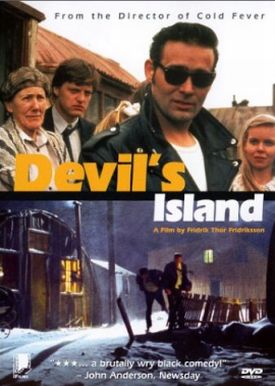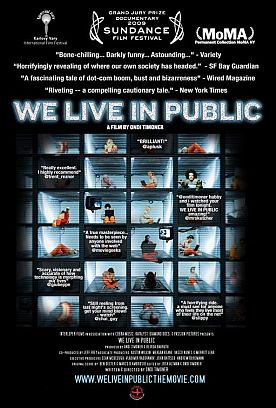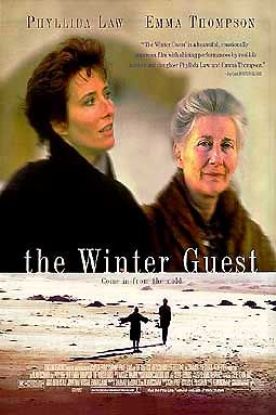Devil’s Island
Devil’s Island, directed by Fridrik Thor Fridriksson and written by Einar Karason is set in the 1950s in a former American army base in Iceland called Camp Thule. Into the army’s wartime Quonset huts there have now moved a collection of poor Icelanders who can afford no better place to live and who are looked down on by their neighbors who live in proper houses. The family from this shanty town we are particularly interested in is ruled over by a crazy old woman called Karolina (Sigurveig Jonsdottir) who is a fortune-teller thought by everybody to be a witch. She is married to a good, humble man called Thomas (Gisli Halldorsson), who allows her to order him about for reasons no more clear than they generally are in such circumstances. As the film begins their daughter is getting married to one of the last of the departing Americans, a Sergeant Charlie Brown, and is on the point of leaving for America with him. We get the impression that she is a good deal more excited by the prospect of being an American than she is by Charlie Brown.
She is leaving behind with her parents her now-grown children, who include two brothers, Baddi (Baltasar Kormakur) and Danni (Sveinn Geirsson) and their married sister, Dolly (Halldora Geirhardsdottir). There seems to be no work and no hope for the two boys. Their grandfather, Thomas, is the only one in the family with a job, but he doesn’t want his grandsons to have to slave, as he does, “at the spillway” where the disgustingly manual nature of his job is hinted at but never spelled out. Consequently, when one of the groom’s fellow American soldiers says good-humoredly to Thomas, “You must be the man of the house,” he replies: “No, I just pay.” The American thinks this is a joke. Before long, Baddi flies off to join his mother and step-father in America. When he returns it is with a red Plymouth convertible, blue jeans, a black leather jacket, an Elvis pompadour and a bad attitude. He moves back in with his grandparents.
In a way, the film is about the unexplained power of batty old Karolina over everyone else in the family, and her equally unexplained indulgence towards Baddi. At the slightest provocation she quotes the more violent texts of scripture and talks about her hatred of the Pharisees and tax collectors, but she seems not to mind at all about her grandson’s drinking and whoring and violent outbursts that keep everyone else up at night. But while baddy Baddi can do no wrong she is forever abusing Thomas for not being quick enough to cater to his whims and give him money for his drunken sprees. “Couldn’t you do with a little less?” Thomas timidly asks his grandson. He cannot. When Baddi has to have all the things he learned to covet in America, including both Coke and Pepsi, a record player and a television set, Thomas has to provide them.
Meanwhile, poor Danni is forced to live in a cupboard and seems a spiritless wretch as much in awe of his Americanized brother as the rest of the family is. He shyly loves the family’s next door neighbor, Hveragedur (Pallna Jonsdottir), the pretty and petite daughter of a giant of a man given to drunken rages. But soon Baddi takes an interest in the girl and Danni, cowed by his brother’s rather overwhelming, Elvis-like sexual magnetism, retires from the field without a fight. At the wedding reception, everyone listens to a local band playing all the latest American rock ‘n’ roll tunes and even the old folks seem to take it for granted that this is now how a wedding ought to be celebrated. Only for a moment, when audience contributions are invited and two old ladies get up to sing an Icelandic folk-song, is there a glimmer of what must have been the old ways. For a moment all eyes are brighter, but then they return to dreary pop music.
All this, I take it, is meant to be a sort of parable of the impact of postwar American popular culture on even so insular and traditional a society as the Icelandic. Krazy Karolina, full of her religious nuttery and absurdly overindulgent to the excesses of idle youth is the very image of a traditional culture gone mad with the promise of the American dream; Danni, Thomas, Hveragedur and others, poor hands at acquisition and self-indulgence, are its victims. To Americans not of the blame-America-first school of thought, this version of our material paradise must seem the tiniest bit hysterical. Yet it is not entirely wrong either. We ought to be able to face up to our faults. And anyone suffering from prolonged exposure to the American media and “entertainment” industry without other resources to put it all into perspective will have moments when he thinks Mr Fridriksson has got it exactly right.
Discover more from James Bowman
Subscribe to get the latest posts to your email.







